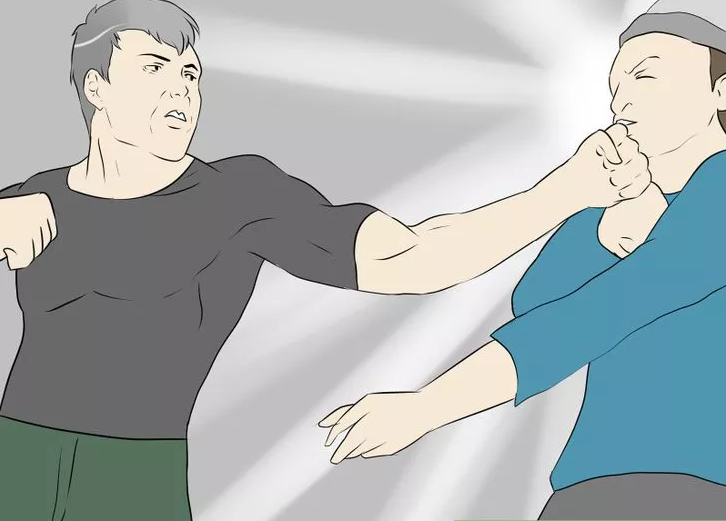The legal provision of justifiable force plays an extremely important role in determining whether a person's act of resistance requires criminal responsibility. However, in both theoretical practice and the application of this provision to prevent and combat crime, there remain many inconsistent viewpoints, leading to the failure to ensure the lawful rights and interests of citizens. Especially in determining the "necessity" of the act of justifiable force.
What is justifiable force under the law in Vietnam? (Internet image)
1. Regulations on justifiable force in Vietnam
Justifiable force is regulated under Article 22 of the Criminal Code 2015 of Vietnam:
1. Justifiable force is the act of a person in protecting their legitimate rights or interests, the legitimate rights or interests of others, or the interests of the State, agencies, or organizations by necessarily counteracting against those infringing upon the aforementioned interests.
Justifiable force is not a crime.
An act is considered justifiable force when it meets the following criteria in Vietnam:
- The act infringing the protected interests must be a crime or clearly pose a significant social danger;
- The socially dangerous act is causing or threatening immediate and actual damage to the protected interests;
- justifiable force not only eliminates the threat, repels the attack, but can also actively counter-attack the infringers, causing damage to the infringers themselves;
- The defensive act must be necessary against the infringing act, meaning there must not be an excessive disparity between the defensive act and the nature and extent of the danger posed by the infringing act.
The right to justifiable force only arises when the illegal attacking act causes damage to the existing interests and shows no signs of ceasing. If the attacking act has practically ceased, the right to justifiable force no longer exists, as causing damage to the person who committed the illegal attacking act at this point is unnecessary and inconsistent with the purpose of justifiable force.
2. What constitutes "necessary justifiable force against the infringing act"?
Necessary does not mean that the damage caused by the defender to the infringer must be equal to or less than the damage threatened or caused by the infringer to the defender.
To assess whether a person's defensive act is necessary or exceeds the permissible limits, all related circumstances must be comprehensively considered, such as:
- The object being infringed;
- The extent of the damage occurring or potentially occurring if the defensive act is not employed;
- The extent of the damage caused by the defensive act to prevent harm to the legitimate interests that need protection;
- The means, weapons, methods used by both parties in the situation; the intensity of the attack by the infringer and the defender;
- The personal characteristics, circumstances, and conditions of each party and the location where the incident occurred.
Only after thoroughly and objectively examining these factors in the real-life context of the incident can a conclusion be reached on the necessity of the decision to use violent counteraction to protect the defender's interests and whether it exceeded the permissible limits.
The necessity in the defensive act is different from the equivalence in actions, not meaning they are equal. In many cases, defensive acts may be disproportionate to the infringing acts but still be considered legitimate justifiable force. Necessity here should be understood as the need to counteract, incapable of not counteracting the infringing acts against societal interests. If it is determined that the counteraction is necessary, the damage caused to the infringer, even if greater than the harm caused by the infringing act to the defender, still constitutes legitimate justifiable force.
Example: A and B have a dispute leading to a fight, B hits A but is blocked by A and hit back. Knowing he cannot beat A, B runs into A's house and attacks A's paralyzed father. Seeing this, A grabs a stick next to the bed and hits B on the head, causing B to lose consciousness. B dies on the way to the hospital. In this case, although the outcome for B is more severe than his act towards A's father, to protect his father’s life and health, A had to counteract. A's counteraction in this situation is necessary, thus, A's act should be considered legitimate justifiable force.
Another example of the necessity of legitimate justifiable force. Ms. H and a neighbor have a dispute leading to an argument. After hearing the story from his wife, Mr. Q, Ms. H’s husband, goes to the neighbor's house and punches Ms. X, the neighbor, because he believes she insulted his family. Mr. M, Ms. X’s husband, returns home and sees the altercation, quickly runs to his house. By this time, Mr. Q has left and is heading to Ms. X’s gate when he meets Mr. M. Thinking Mr. Q’s use of violence against his wife would affect their four-month-old unborn child, Mr. M strikes Mr. Q on the head with an iron hoe, causing Mr. Q to suffer a skull fracture and die on the way to the hospital. Mr. M’s action in this case is determined to be unnecessary as Mr. Q’s act of infringing interests had already ended. Therefore, Mr. M's use of the hoe causing harm to Mr. Q in this situation is not considered legitimate justifiable force.
Legitimate justifiable force is not a crime, but if the defensive act clearly exceeded the necessary limits and is inconsistent with the nature and extent of the social danger posed by the infringing act, it is considered exceeding the limits of legitimate justifiable force. The person who exceeds the limits of legitimate justifiable force shall bear criminal responsibility. However, criminal responsibility in such cases is significantly less severe than crimes not related to exceeding the limits of legitimate justifiable force.
Duc Thao
- Key word:
- justifiable force
- Vietnam
 Article table of contents
Article table of contents











.Medium.png)
.Medium.png)
.Medium.png)
.Medium.png)
